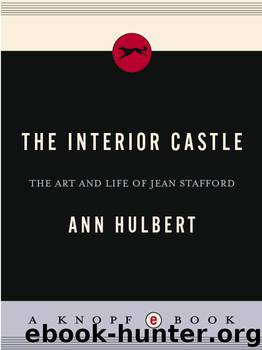The Interior Castle by Ann Hulbert

Author:Ann Hulbert [Hulbert, Ann]
Language: eng
Format: epub
ISBN: 978-0-8041-5123-8
Publisher: Knopf Doubleday Publishing Group
Published: 2013-10-08T16:00:00+00:00
The young Cora, suffering from headaches and unhappiness, was distinctly on the outskirts, estranged from her poet husband, Theron Maybank, and skeptical of “Theron the poet’s poet friends. He was beside me and they were in all the rooms around me and in the barn, but I was dead to their world, and they, thereby, were dead to mine.” She was like a ghost hostess, actively arranging the domestic details of the influx but passively aloof from the artistic, erotic intrigue. Not that she was unaware of it. Cora saw, as through a hazy scrim (of drink, she acknowledged, and depression), all the flirting and flattering going on—especially between her husband and Minnie Rosoff, the Gertrude Buckman character whose visit was the most fateful of the entire influx. But out of a perverse instinct for escape and for self-mortification (precisely the opposite of the poets’ self-preening inclinations) she could only abet the adulterous romance: “I helped in every way to make the match which was already a fait accompli and which, when I discovered that it was, was to hurtle me off the brink on which I had hovered so long into a chasm.”
The older Cora was very much present, recounting and commenting on events, in an outspokenly colloquial and rather curmudgeonly style that established the distance she had traveled since that summer. Where the young Cora was blind and self-destructive, the older Cora had a therapeutic clarity. She was not venting bitterness; her tone was too entertainingly farcical for that. She was simply setting the record straight with satiric zeal. “(Mine! Remember, Cora Savage, if you forget all else, that this is your house),” she scolded her past self in one of the conversational parenthetical asides that litter the story. “(God almighty! Never was a man so set on knocking the stuffing out of his bride!),” she exclaimed at another point. The effect, along with her device of casting the poets (and herself) as children, was to knock all of them off their pedestals, to offer an irreverent look into the legend. The “baby bards,” as she described them, were infantile in their self-absorption—but not innocent, by any means. This was the point at which their flailing ambitions were becoming more focused. “(Though they were no longer enfants terribles, the blood of despots was in their veins and they would very soon usurp their elders’ thrones and their dominions),” the older Cora reported, looking back.
Young Cora was oppressed by the poets’ self-importance, but docilely played her role as helpmeet, typing endless revisions of Theron’s poems and listening to endless recitations of poetry. In the story the older Cora wasn’t docile at all and was perfectly prepared to risk philistinism in declaring her position. “I was in this throng of litterateurs (three poets in one medium-sized room constitutes a multitude), enjoying nothing.” The once-loyal typist was none too respectful: “(I admit they were brilliant poets, if you happen to be interested in that sort of thing), but if they changed an ‘a’ to a ‘the’ the whole sonnet had to be typed over again.
Download
This site does not store any files on its server. We only index and link to content provided by other sites. Please contact the content providers to delete copyright contents if any and email us, we'll remove relevant links or contents immediately.
| Books & Reading | Comparative Literature |
| Criticism & Theory | Genres & Styles |
| Movements & Periods | Reference |
| Regional & Cultural | Women Authors |
4 3 2 1: A Novel by Paul Auster(12362)
The handmaid's tale by Margaret Atwood(7749)
Giovanni's Room by James Baldwin(7315)
Asking the Right Questions: A Guide to Critical Thinking by M. Neil Browne & Stuart M. Keeley(5751)
Big Magic: Creative Living Beyond Fear by Elizabeth Gilbert(5744)
Ego Is the Enemy by Ryan Holiday(5407)
The Body: A Guide for Occupants by Bill Bryson(5072)
On Writing A Memoir of the Craft by Stephen King(4924)
Ken Follett - World without end by Ken Follett(4716)
Adulting by Kelly Williams Brown(4561)
Bluets by Maggie Nelson(4541)
Eat That Frog! by Brian Tracy(4511)
Guilty Pleasures by Laurell K Hamilton(4436)
The Poetry of Pablo Neruda by Pablo Neruda(4087)
Alive: The Story of the Andes Survivors by Piers Paul Read(4014)
White Noise - A Novel by Don DeLillo(3999)
Fingerprints of the Gods by Graham Hancock(3983)
The Book of Joy by Dalai Lama(3966)
The Bookshop by Penelope Fitzgerald(3839)
